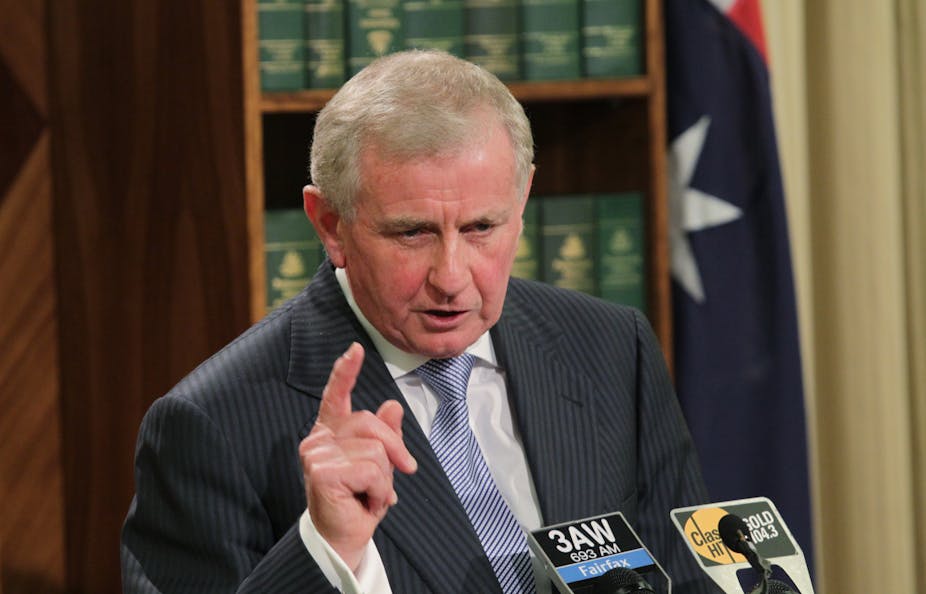In the shadow of Monash University’s Clayton campus landmark Menzies Building to its north and with the affluent bayside Melbourne suburbs to its south and west lie the flat lands of the federal seat of Hotham.
Named after a colonial governor who couldn’t cope with the Eureka rebellion, Hotham had been a Liberal seat back in the days when the electorate was centred on the more affluent areas of Moorabbin and Bentleigh and Don Chipp was the sitting member. Hotham’s push to the east with successive redistributions has made it one of the safest Labor seats in the country.
The 2011 Census explains why this is so. This is an electorate where nearly half of the population were born overseas, and slightly less than half of its households speak a language other than English at home. The ethnic diversity of this seat is in full display in its major business and shopping districts of Clayton. These are prosaic shops: median family income is at about the state-wide average. Hotham isn’t a poor place, but it isn’t particularly affluent either.
Hotham is a blue-collar electorate, notwithstanding the impact of Monash University and the rump of Liberal-voting upper middle class suburbs such as Bentleigh and Murrumbeena on its western edge. The heart of the electorate is dominated by factories, light and heavy industry, warehousing and noxious works (tips, market gardens, poultry farming and Moorabbin Airport).
To its south are the new housing estates of Dingley and Keysborough. To the east are the sprawling 1950s working class suburbs of the Greater City of Dandenong and its surrounds such as South Springvale (complete with Buddhist temples, mosques and sprawling Orthodox churches all reflecting the ethnic composition of the district) and, of course, Clayton. Indeed, Clayton is the heart of Hotham, and the state seat – also a very safe Labor seat - falls entirely within the federal electorate.
With its demographic shift towards industrial and multicultural Greater Dandenong, Hotham has become not only a safe Labor seat, but a place where internal Labor intrigue is played out. The first Labor member to be elected was Lewis Kent who won the seat in 1980. Kent won again in 1983, 1984 and 1987 but his hold on the seat was being undermined by Labor’s factional system and successive redistributions. Kent was Socialist Left-aligned and came from Highett on the western fringe of the electorate.
The shift of Hotham towards Dandenong meant that the branch input to the pre-selection process was changing with the inclusion of big branches of ethnically diverse groups who were organised by, and loyal to the Labour Unity faction on the party’s right. Ahead of the 1990 election Kent was persuaded to run in the newly formed seat of Corinella (which he lost) and in his place the ascendant Labor Unity faction backed the former secretary of the Storeman and Packers Union (these days called the National Union of Workers (NUW)), former Australian Council of Trade Unions (ACTU) president and son of a past Labor luminary, Simon Crean, for Hotham.
The fact that the Creans were actually based in South Melbourne mattered little, and Simon was elected and held Hotham until his retirement from politics this year amidst the Rudd-Gillard leadership turmoil. What was more important was the fact that he had NUW backing and the NUW was a major influence in Labor Unity at that time.
Crean had quite a significant career as a minister and shadow minister and, at one time, as leader of the opposition. However, it was after he lost the leadership that an attempt was made by forces within the Labor Unity faction to get rid of Crean and replace him with a younger NUW player, Martin Pakula.

This incident indicated the extent to which Labor Unity had fractured into sub-factions. Crean found himself in a power struggle with two other emerging factional figures Steven Conroy (an acolyte of Robert Ray and senator) and Bill Shorten, at that time a deputy party president and secretary of the Australian Workers Union.
To defend himself, Crean had to find a way to combat the apparent loss of NUW support and relied on the assistance of the local branches to do so. Of these, the branches in Springvale and Clayton were critically important. Made up primarily of people with Vietnamese and Cambodian backgrounds, these members were marshalled by another important player - Hong Lim, the state Labor MP for Clayton.
The reason for this big Asian presence in the party was also geographic. Until recently, a major migrant reception centre was located at Westall in the heart of the electorate and a large south-east Asian community had settled in the adjacent suburb of Springvale. As one of their prominent community leaders, Hong Lim had emerged as a major player in the internal Labor affairs in the district.
These forces were at work again in the pre-selection of the Labor candidate who will replace Simon Crean although the process has been far from smooth. In a sign of changing times, Hotham won’t be contested by a Labor bloke from the trade unions. Nor, indeed, will Labor be putting up someone whose ethnicity reflects the community being represented.
Instead, Claire O'Neil, a Monash University graduate management consultant with a post-graduate degree from Harvard (courtesy of a Fulbright Scholarship), will be the Labor candidate and will win the seat. O’Neil secured pre-selection following the dumping of the former pre-selected candidate, Geoff Lake, who pays a high price for once having sworn at a fellow Monash City councillor - much to the chagrin of prime minister Kevin Rudd (himself noted as something of a potty-mouth).
O’Neill will have Fazal Cader as her Liberal opponent, Lorna Wyatt as her Green adversary and, so far, Samuel Porter has also put up his hand on behalf of the Palmer United Party. O’Neil will defeat all of these people and will have the prospect of a long parliamentary career provided Hotham’s factional politics are kept under control.

